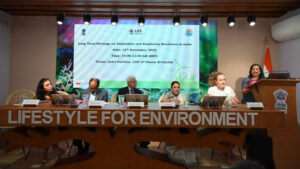Physical Address
23,24,25 & 26, 2nd Floor, Software Technology Park India, Opp: Garware Stadium,MIDC, Chikalthana, Aurangabad, Maharashtra – 431001 India
Physical Address
23,24,25 & 26, 2nd Floor, Software Technology Park India, Opp: Garware Stadium,MIDC, Chikalthana, Aurangabad, Maharashtra – 431001 India

The much-awaited UN Climate Summit, COP27, started at Sharm El-Sheikh, Egypt on 6 November, 2022 and is scheduled to run till 18 November 2022. Over 45,000 registered COP27 participants and over 120 heads of states and governments are expected to attend the summit in these two weeks. The Indian delegation is headed by the Union Minister of Environment, Forest and Climate Change, Shri Bhupender Yadav. The first week is over and here is a sum-up of all the interventions and statements made by India so far at COP27.
India blocks attempt to club it with historical polluters
India prevented wealthy nations from focusing on the top 20 carbon dioxide polluters during negotiations on the “Mitigation Work Programme” at the current U.N. climate summit in Egypt with the help of other developing nations. The developed world wanted discussion of significant emission reductions to include all top 20 polluters, including China and India, rather than just the wealthy countries historically responsible for climate change. The top 20 emitters list includes developing countries like India that are historically not responsible for the warming that has already occurred. India pushed back the attempt with the support of like-minded developing countries. India had earlier said that the MWP cannot be allowed to “change the goal posts” set by the Paris Agreement.
India Insists on New Global Climate Finance Target by 2024
India is one of the developing nations pressuring developed nations to accept a new global climate finance target at COP27. India stated that given the magnitude of their needs, poor countries needed a “substantive enhancement” in climate finance from developed nations by 2024 as opposed to the prior target of $100 billion annually by 2020 which was not significant enough in comparison to their needs.
On behalf of like-minded developing nations, India highlighted at a high-level ministerial dialogue on (new collective quantified goal) NCQG on Wednesday at COP27 that developed countries must provide financial, technological, and capacity-building support for climate actions to meet the Nationally Determined Contributions (NDC) targets.
India roots for phase-down of all fossil fuels and not just coal
India highlighted the most recent IPCC reports to emphasize that reaching the 1.5 or 2 degree Celsius temperature targets required the phase-down of all fossil fuels, not just coal. It is being termed as an effort to counter the pressure on coal that is likely to come its way again. India further claimed that the selective designation of particular energy sources as “green” was unsupported by science and exposes the duplicity of the developed nations. India stated that the cover text must therefore admit that all fossil fuels contributed to greenhouse gas emissions and push for an expedited global shift to clean energy while taking into account the unique specific conditions of various nations.
Loss and Damage – Main responsibility with the Developed World
Following Antigua and Barbuda’s demand that India and China, two major polluters, be made liable for damages incurred by smaller nations due to climate disasters, both nations answered that they were ready to assist but that the main responsibility still lies with the developed world. According to reports, India has reacted by stating that it is an obligation of the developed countries to pay for loss and damages and it has to be realized that India itself is a victim of the emissions of developed countries.
India joins Mangrove Alliance for Climate
India joined the “Mangrove Alliance for Climate” (MAC) launched on Tuesday (Nov 8, 2022) on the sidelines of the UN climate summit COP27, to strengthen the conservation and restoration of mangrove ecosystems worldwide. The MAC has been spearheaded by the United Arab Emirates (UAE) in partnership with Indonesia and India, Australia, Japan, Spain and Sri Lanka have joined the alliance as partners. It has been set up for the conservation of mangroves with cross-boundary cooperation to meet the intentional climate goals.
Technology cannot remain confined to big players
Technology cannot remain confined to big players and MSMEs and start-ups need to be enabled to access finance for using it optimally. Environment Secretary Leena Nandan said this while speaking at a panel discussion on “Technology Needs Assessment for Sustainable Life” at the India Pavilion at COP 27 to identify technology needs and their assessment for adoption for the sustainable well-being of global citizens in the future.
The Environment secretary said that what India and the world need today is technology. “Climate change is not an issue confined to those who are seen as emitters. There is now a realization and larger and uniform understanding that climate change cannot be wished away. It is knocking at our door,” she said.
India underscores need of finance for adaptation
India said that adaptation must be at the forefront of development interventions. Underscoring the imperative need for finance for adaptation, India pointed out that developing a global baseline to enhance transparency and investor confidence is a crucial measure in enhancing adaptation readiness. Environment Secretary Leena Nandan emphasized the need for information dissemination to strengthen communities for adaptation while speaking at a session on ‘Long Term Strategy on Adaptation and Adaptation Readiness in India’, organized by The Energy and Resources Institute, TERI.
Comments are closed.
Hi
[…] [9] https://climatefactchecks.org/india-at-cop27-interventions-and-statements-by-india-so-far/ […]
[…] Also, read this in English […]